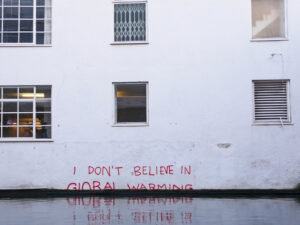Competencies
Scientific Literacy

Banksy (2009)
A competency I have been developing that holds great significance for me is Scientific Literacy. In fact, I developed my entire Life Sciences 11 course (practicum 491) with this through-line in mind and communicated explicitly to my learners. Our first unit was actually titled “Scientific Literacy” and was a lens for us to peer through throughout the quarter, encompassing many other important competencies like Critical Thinking, Intercultural Awareness, Numeracy, Literacy, Creativity, and Civic Responsibility. According to the BC Curriculum “Scientific literacy is important, multi-faceted, providing a context for addressing societal issues… Scientifically literate citizens can better cope with problems, making intelligent and informed decisions that will affect themselves, those around them, and the environment” (2019). I asked my learners to focus on the core competencies: “I can examine evidence from various perspectives to analyze and make well-supported judgments about and interpretations of complex issues”, and “I am willing to explore controversial issues, and I can imagine and work toward change in myself and in the world.” This ties back to my focus of global citizenship. This unit and examples of these competencies can be found here.